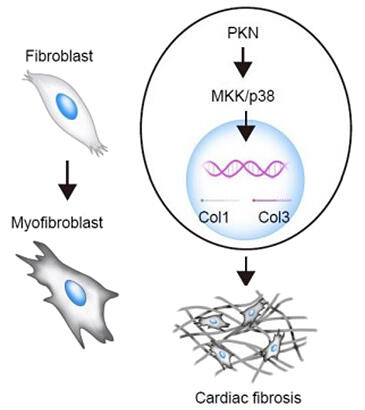A research group led by Graduate Student Satoya Yoshida, Lecturer Mikito Takefuji, and Professor Toyoaki Murohara of the Graduate School of Medicine at Nagoya University revealed that protein kinase N (PKN) plays an important role in cardiac fibrosis. The research group will now move forward with the development of new heart failure therapies targeting PKN. The work was published in Nature Communications.

Provided by Nagoya University
The number of patients with heart failure is rapidly increasing worldwide. When the heart is damaged, it tries to maintain its structure by forming fibrotic tissue. However, excessive fibrosis impairs and reduces cardiac function, leading to the development and exacerbation of heart failure. The mechanism of cardiac fibrosis remains largely unknown.
The research group has previously shown that PKN activity is involved in myocardial hypertrophy and heart failure. In this study, they examined the role of PKN in cardiac fibrosis with a focus on cardiac fibroblasts. Cardiac fibroblasts express PKN1 and PKN2, which are then activated by stimulation with Ang II and TGFβ.
Cardiac fibroblast-specific PKN knockout mice were generated and compared to wild-type mice in terms of the extent of fibrosis and cardiac function after myocardial infarction. In the former, cardiac fibrosis was suppressed, and the left ventricular contractility was improved.
Cardiac fibroblasts primarily possess the abilities to proliferate, migrate, and differentiate into myofibroblasts. Stimulation of PKN-knockdown cardiac fibroblasts with TGFβ markedly decreased αSMA expression and suppressed collagen I and collagen III production. However, proliferative and migratory capacities did not change significantly compared to those of control cells. Furthermore, they examined the mechanism by which PKN regulates differentiation of cardiac fibroblasts.
It has been shown that p38MAPK and Smad2/3 are involved in differentiation of cardiac fibroblasts. PKN knockdown markedly suppressed p38MAPK activity, whereas PKN overexpression enhanced p38MAPK activity. Meanwhile, no effect on Smad2/3 was observed.
In addition to myocardial infarction, heart failure with preserved ejection fraction (HFpEF) was also tested. Fibrosis was suppressed in cardiac fibroblast-specific PKN knockout mice compared to wild-type mice. The progression of diastolic dysfunction was also suppressed.
These results indicate that PKN plays a major role in cardiac fibrosis and is a new therapeutic target.
Journal Information
Publication: Nature Communications
Title: Protein kinase N promotes cardiac fibrosis in heart failure by fibroblast-to-myofibroblast conversion
DOI: 10.1038/s41467-024-52068-0
This article has been translated by JST with permission from The Science News Ltd. (https://sci-news.co.jp/). Unauthorized reproduction of the article and photographs is prohibited.




